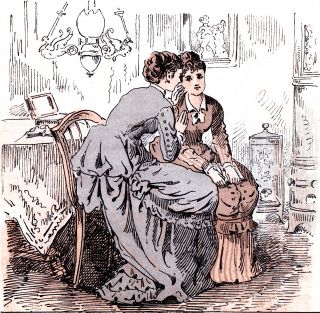Looking back at my life, if I were to identify a common theme, it is feeling misunderstood. It sounds so much like a cliché, that many roll their eyes when hearing the phrase. “Everyone feels misunderstood,” they say. But what’s interesting is that those in my life who have said that, have gradually come to realize that it is true. Much of how I am seen has been distorted through a lens that never fit me.
The first time I really remember putting these feelings into words was in my teens, in an essay I’ve since published, in part, in a previous post. Back then I wrote, “I spend all my life trying to find someone who will understand, but because of my life, I wind up having to give them a tutorial about how I act and why.” As much as I’d like to think of this is just teenage angst, it still applies to me as much today as it did back then.
Of course my understanding of it has changed. Back then, I just thought that it was the unusual circumstances of my life that led me to have those experiences. But after talking to others on the autism spectrum, I realized that the experiences I have are just as common amongst those who didn’t have my type of upbringing. My isolation had a lot to do with autism.
![//creativecommons.org/licenses/by/2.0)], via Wikimedia Commons //creativecommons.org/licenses/by/2.0)], via Wikimedia Commons](https://cdn.psychologytoday.com/sites/default/files/styles/article-inline-half/public/field_blog_entry_images/Broken_Heart.jpg?itok=gtKtbbWf)
In that essay I went on to say,“I feel trapped in a world that judges me at every turn and yet never bothers to try to help or understand.” This part, I can at least say that I feel has changed—at least somewhat. I wish I could say that this change was a result of change in society, but I can’t really say that I see that it’s changed that much.
What’s changed is my self-awareness, and ability to translate my differences in ways that others understand. But it’s been a very, very long road. Even those who’ve known me for decades, have been slow to realize the scope of my differences, and how that understanding needs to change the meaning they assigned my behavior.
Previously, I have compared communication across neurotypes to communication across cultural divides. A couple of years ago, Ennien Ashbrook, blogger and contributor to my book, wrote a blog series that I felt took this comparison to the next level. In the series, she wrote about how many behaviors typical amongst those of us on the spectrum can be misconstrued by neurotypical individuals as having a meaning that was absolutely not intended. A few of the scenarios she covered could’ve been lifted verbatim from my own life.
“A nice example is how many people with AS express empathy. The neurotypical person describes something that happened to them, and the person with AS nods, then begins to describe a time when they went through something similar. The conversation continues, the NT person describes another situation, and the AS person replies with their own similar experience. The NT person grows more nettled. Later, the AS person learns that the NT person dislikes talking to her because she’s ‘always dragging the spotlight back onto herself, always one-upping people.’
The AS person is devastated. She’s confused, because she was connecting with the NT person’s stories, and sharing her own experiences as a way of saying ‘I’ve been there, too.’ Her experiences of being ‘one-upped’ is different from what she was doing, so she doesn’t understand why someone would think she was one-upping.
If she tries to seek clarification, she may be met with a scornful or astonished look and told something like ‘how did you think they would take it?’ If the AS person tries to explain that she wasn’t one-upping, she may be rebuffed with ‘Yes you are! You always do!’”
Reading this was like reading a page out of my diary from years ago. I can’t tell you how many times I’ve had this happen. And the pain of it is having your intentions misjudged. It’s never easy to feel that you tried to connect with someone only to the be rebuffed and judged. But it is emblematic of the types of perception problems many of us on the spectrum face.
What’s also interesting about it is that it flies in the face of multiple myths that are often perpetuated towards people on the spectrum. The idea that we don’t have body language. The idea that we don’t have empathy. In one of my very first blog posts here at PT, I asked the question: “...is it possible that [what researchers identify as] mindblindness is partially due to the differences between autistic and non-autistic thought processes?”
Ennien’s observations, which are very much in line with my own, seem to provide an answer: “Over the past year, I’ve spoken to a lot of people who were recently diagnosed with Asperger’s Syndrome, who are meeting other people with AS for the first time. I listen to them and I express empathy in this manner—and they all smile and say they feel heard and understood, often for the first time. They intuitively understand my intent, *even though they may never have met another person with AS before.*” Hmmm….
The second post in Ennien’s series was one that I found particularly insightful, yet troubling at the same time. In it, she wrote about how many behaviors that are typical to women on the spectrum can be misunderstood as sexual interest. This, of course, can be extremely problematic and all kinds of contexts—and may even lead a woman to be victimized. The scenarios she described sounded way too familiar.

In my teen years, especially, I was often confused why others sometimes seemed to perceive me as being sexually forward when in reality my inclination was anything but. I’ve written elsewhere of my feelings of being out of sync with the culture of my time and well, my sense of sexual ethics was no different. Between my identification with Victorian mores, and my conservatively Christian stepfamily, I was not going to be anybody’s idea of a sexual adventurer. So why was it that rumors tended to swirl around me?
Some of it, of course, was typical mean-girl bullying. Sadly, all too often in high school the social weapon of choice for girl-on-girl verbal violence involves the questioning of one another’s sexual “purity” or, conversely, their lack of experience. It was something I found deeply confusing at the time, because it seemed that regardless of your sexual status you never won.
My solution, then, was to not play the game. I focused on academics and opted out of the whole dating scene. It was too much. There was too much I didn’t understand, and too much I feared. For me, sex and commitment went hand-in-hand. I did not know how to function in a social environment where that seemed to be an anathema.
This was also made more complex by the fact that up until puberty, I often found it much easier to relate to the opposite sex. Once I became attractive to members of the opposite sex, it turned my whole social world upside down. At times, I was naïve enough to think that all could go on as before, but I learned the hard way that it couldn’t.
I remember this class I had early in high school. Two of our teachers had decided to teach in tandem, leading to an interesting set up. In essence, it meant that we had two hours a day with exactly the same kids.
Naturally, this meant that we tended to build more relationships in this class than others, especially since projects were highly collaborative. In this class, I connected with three boys. They always set near me, we would collaborate on projects, and chat before or after class.
They would walk me from class to class, and take turns carrying my big, heavy backpack. They insisted there was nothing behind this, that they were simply being gentlemen. I was new to the area and thought perhaps this was just something that was culturally different about the area where I now lived.
Of course, other kids saw it differently and began to whisper, assuming something strange was going on. But I took comfort in the fact that when challenged they answered exactly the way I would. They said we were friends,and only friends. They said I was like a sister. I believed them.
I believed them until one day at the public library, when I bumped into one of the three. I said “Hi,” exchanged pleasantries, and went about my business. He followed me, and in a deserted area behind a bookcase, he did his level best to try to feel me up. Then I didn’t believe them anymore. From that point on, I became more cautious about male friends. Already I had been careful about being alone with a boy, now I was even more cautious.
Ennien’s post brought many experiences like this to the fore, and made me question still others. Many of the things she describes are things that I’ve caught myself doing in the corporate environment. It makes me wonder sometimes if I’m not still subject to the same misconceptions.
If, for example, when I meet with exec whom I know to be highly social and I feel the pressure to appear neurotypical, are my attempts to mirror body language and modulate my voice achieving the desired effect? Or do they send a different message? Do I sound like some sort of breathless Marilyn Monroe playing up to the president?
For my part, I’m not sure I’ll ever know—it’s not exactly something that you can ask. And if you do, your reasons for doing so will never be believed to be what you say they are. So, I can only do my best, hope for the best, and reconcile myself to the fact that some will misunderstand. And, I know that it is not unique to women. In fact, I wrote of one such situation nearly ten years ago on my first blog, where the person misunderstood was male.
What I have learned though, is that awareness of these differences can go a long way to prevent misunderstandings. Sometimes it can be as simple as adding a sentence to what you say. For example, I haven’t been accused of “one upping” anyone in many years. It’s possible that the people around me simply have chosen not to say, but I’ve also found that it has helped to prefix my stories with the simple phrase such as, “I can understand that because…” to frame up the purpose of telling the story.
In other instances, a solution isn’t so clear. But posts like Ennien’s have helped me to be aware and to sometimes curtail, for my own sake, the type of stims or behaviors that may lead to misunderstanding. So, a question for readers: Have you had experiences like this? If so, how have you coped?
I just couldn't choose one version of this song, so see more by Nina Simone and Cyndi Lauper.
For updates you can follow me on Facebook or Twitter. Feedback? E-mail me.
My book, Living Independently on the Autism Spectrum, is available at most major retailers, including Books-A-Million, Chapters/Indigo (Canada), Barnes and Noble, and Amazon.




